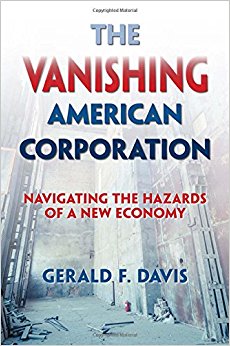The Vanishing American Corporation: Navigating the Hazards of a New Economy (March, 2017)
Gerald F. Davis

It may be hard to believe in an era of Wal-Mart, Citizens United, and the Koch brothers, but corporations are on the decline, says Gerald Davis. The number of American companies listed on the stock market dropped by more than half between 1997 and 2012. In recent years we've seen some of the most storied corporations go bankrupt (General Motors, Chrysler, Eastman Kodak) or disappear entirely (Bethlehem Steel, Lehman Brothers, Borders, Circuit City).That corporations are vanishing may sound like good news to some, but Davis insists it's not—in fact, it's a root cause of the income inequality and social instability we face today. Corporations were once an integral part of building the middle class. He points out that in their heyday they offered millions of people lifetime employment, a stable career path, health insurance, and retirement pensions.
The businesses that are replacing them can't and won't fill the same role. For one thing, they employ far fewer people—the combined global workforces of Facebook, Yelp, Zynga, LinkedIn, Zillow, Tableau, Zulily, and Box are smaller than the number of people who lost their jobs when Circuit City was liquidated. And the “sharing economy” absolves many companies of any sense of obligation to most of the people who work for them—at the end of 2014 Uber had over 160,000 “driver-partners” in the United States but recognized only about 2,000 people as actual employees.
This book tracks the rise of the large American corporation, its role in greatly expanding the middle class, and the current economic pressures that are making it unsustainable. The future could see either increasing economic polarization, as careers turn into jobs and jobs turn into tasks, or a more democratic economy built from the grass roots. It's up to us. [from publisher web site]
Oakland, CA: Berrett-Koehler Publishers, Inc.. 222 pages.
ISBN: 9.78163E+12
Call number: HD2785 .D26 2016